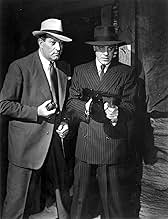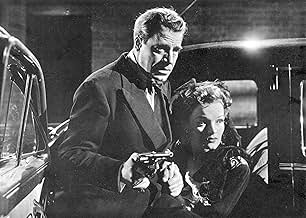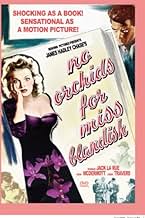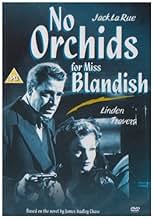Aggiungi una trama nella tua linguaJohn Blandish is worth $100 million. His heiress daughter is soon to be wed to Foster Harvey, who believes she's a cold, unfeeling woman, despite loving her. Her cold emotional state is in l... Leggi tuttoJohn Blandish is worth $100 million. His heiress daughter is soon to be wed to Foster Harvey, who believes she's a cold, unfeeling woman, despite loving her. Her cold emotional state is in large part due to leading a restricted life. A low level thug named Johnny overhears their ... Leggi tuttoJohn Blandish is worth $100 million. His heiress daughter is soon to be wed to Foster Harvey, who believes she's a cold, unfeeling woman, despite loving her. Her cold emotional state is in large part due to leading a restricted life. A low level thug named Johnny overhears their secret wedding night plans, and peddles the idea of robbing her of the $100,000 worth of d... Leggi tutto
- Regia
- Sceneggiatura
- Star
- Doc
- (as Macdonald Parke)
- Ma Grisson
- (as Lilly Molnar)
- Riley
- (as Richard Nelson)
Recensioni in evidenza
Violent and (for it's time) sexually suggestive, lurid and melodramatic, nothing St John Clowe's movie contained pleased critics more happy with a realistic tradition of filmmaking, or middle-class literary adaptations for discriminating audiences. In retrospect the categorisation of No Orchids For Miss Blandish seems less problematical. Neither sophisticated literary screen transposition nor completely convincing gangster piece, laced with titillation, and with roots in trash culture, These days the movie is better seen as a landmark of British crime exploitation cinema.
At its heart lays a love story: that between Slim Grisson and Miss Blandish. It's a tragic tale too; not just because of the end which awaits the couple, but also in that Grisson is shown as being a fervent, secret admirer of the heiress from the very first scene (his distinctive double dice emblem on the card accompanying flowers) and so, ultimately, is just as much a victim of events as she. His tragedy is that he soon finds himself overseeing the kidnapping of the woman he loves, while Miss Blandish has the misfortune of falling for someone entirely unsuitable, socially or morally.
But without the sexual experience he brings she would, it seems, be condemned to eternal frigidity. It is no accident that, early on, her fiancé refers to the "ice in her veins" which needs 'melting'. Indeed one of the many things critics found unacceptable in the movie was the depiction of a woman's sexual awakening, particularly when tied to a liaison out of her class - something miles away from the usual Noel Coward-type drawing room infatuation. It's a scenario helped by some sensitive direction by St John Clowe, in a work characterised over all by some fluid camera-work.
Some have criticised the director for clumsiness, but I can't see it. To give a standout example: although we know Grisson is 'stuck' on the heiress, nothing is said between them, except for a barely perceptible nod at her by the hoodlum after their first shock meeting. At a crucial moment later St John Clowe has Grisson, clearly thinking of the woman, walk slowly up his nightclub stairs, a fairly long crane shot. His impassive face is briefly superimposed onto hers. Then in the love scene which follows she leaves him, wavers, and comes back after a tense delay - events mostly off-screen. We still do not see them together, merely (for the second time) some orchids, and his words of relief spoken over the held flower shot. For a film so explicit elsewhere, the restraint and sensitivity of direction here is striking.
As Slim Grisson, Jack La Rue is impressive; more so when one remembers that it is almost half an hour before he is first seen on screen at all. A performance over-indebted to George Raft maybe - his habitual dice throwing recalling the American star's famous coin-tossing trademark - but still touching as a love-lorn thug and whose regular lack of expression and stolid soulfulness says more than any amount of mugging could do. As Miss Blandish, Linden Travers has attracted good words, too.
Others in the cast, even allowing for the variable American accents, are admittedly less strong. Ma Grisson (Lilli Molnar), who starts out, Ma Barker-fashion, as the leader of the gang, is less menacing that one might have wished; 'Doc' the Sydney Greenstreet-type among the supporting cast is too much of a stereotype to be convincing. However, mention ought to be made of Walter Crisham's Eddie, Grisson's frightening henchman, a very intimidating and malevolent presence. While some aspects of No Orchids For Miss Blandish have been ridiculed, the budget was obviously quite a reasonable one; the nightclub fairly expansive and convincing for instance, allowing the director a chance for multiple set-ups.
Of course the club, Grisson, and his followers are a world away from Miss Blandish's previous social circle. In a way characteristic of British noir and thrillers, the film has a firm idea of class; not only in the separation of crooks and toffs, but upstairs and downstairs (the working class lovers overhearing the conversation of their betters from the basement, at the start), as well. Even the underworld has its social structure, one which the 'success' of the Grisson gang is contrasted to the smaller group doing the initial kidnapping. Only love, it seems, can cross these boundaries, but then such romance is fraught with risk. For Miss Blandish, her new relationship brings 'freedom', this from the "first man I've ever met" - a slight emphasis on 'man' when she speaks, implying the anaemia of the class she has just rejected.
To those who wish to discover what all the fuss was about, I can say that the film may be variable, but entertaining and memorable. It's certainly an important document of Britain's cinematic underbelly. No plaudits for Miss Blandish perhaps, but no outright dismissal here either.
The original novel had been judged unfilmable by Hollywood, but the Poverty Row studio Renown set out to prove the moguls wrong. The resultant outcry led Harold Wilson, a future premier who was the government minister responsible for films, to declare at an industry banquet- to loud applause- that he was glad there were "no Oscars for Miss Blandish".
The fuss probably killed the career of Linden Travers, who had been in pictures since the mid-1930s but made no more appearances after 1949, dying 52 years later. Neither did its helmer, St John L Clowes, ever direct again. Interestingly, as far as I know the picture to this day has never appeared on British TV.
I saw it when I was sixteen and I loved it, even buying the record of the background music (Song Of The Orchid). It had a mostly British cast with one imported American *star* Jack La Rue. It would be interesting to see it again fifty years later. I imagine the violence everyone complained of would seem pretty tame by today's standards.
Having been impressed with the Aldrich version and being something of a sucker for bad cinema (especially from this vintage), I acquired the film immediately when the opportunity presented itself though I only got to watch BLANDISH now as part of my ongoing Noir marathon. As often happens, the movie is nowhere near the stinker most claim it to be: granted, the performances are hilariously over-the-top (thus a fount of entertainment in itself!), the would-be American accents do not fool anyone (there is even future "Carry On" stalwart Sidney James, for cryin' out loud, not to mention a stand-up comic amusingly spoofing the Hollywood double-act of Sydney Greenstreet and Peter Lorre!) and, frankly, the gall of it all makes the experience that much more fascinating, almost hypnotic!
In comparison with the later version (but typical of its era), the leads here are over-age: they are Jack LaRue (the only genuine Yank in the cast: incidentally, he is far removed from the Mama's Boy as played by Scott Wilson in the remake) and Linden Travers (previously noted for supporting parts in spy thrillers like Hitchcock's superb THE LADY VANISHES [1938], she is the personification of elegance rather than Kim Darby's society brat). Incidentally, both novel and film(s) were criticized for glorifying violence (this is indeed quite brutal for the time) and the notion of 'Amour Fou' since the kidnapped heiress ends up falling for her psychotic captor. Other notable characters are the obese Mob-leading mother (Lilly Molnar), a no-less unhinged member of the gang who becomes involved with the girl who ultimately gives them away (Walter Crisham 'standing in' for Tony Musante), a thuggish cohort (played by Danny Green, later of THE LADYKILLERS [1955]), and a crusading reporter (a much-younger Hugh McDermott 'replacing' Robert Lansing).
The photography (by Gerald Gibbs) is reasonably atmospheric, smoothing over the general amateurishness on display, and there is another definite asset in its lush score. However, one major difference from the obviously superior remake is the film's surprisingly downbeat ending. For the record, I recently acquired another rare Hadley Chase adaptation, the French-made FLESH OF THE ORCHID (1975) – co-scripted by Luis Bunuel regular Jean-Claude Carriere!
Linden Travers looks lovely in the title role. This actress was, generally associated with a different sort of film. She's beautiful and elegant. But she gives this part her all.
"No Orchids For Miss Blandish" is a British movie trying to seem an American. For us today, that's very much a reversal: How often do American movies try to put on the dog and portray the British! Unfortunately, the movie at hand doesn't really succeed. We don't believe it's taking place in the US. Even though we're shocked at the nonstop violence, we don't believe the story fully, either.
Jack La Rue is good in the male lead. He was American. He is convincing.
I wish I could say I recommend this as more than a curiosity. Ms. Travers is indeed superb. But it isn't terribly good. Not bad but, apart from the exceptional violence, nothing special either.
Lo sapevi?
- QuizThe film caused huge controversy in the UK after it was passed with an uncut "A" rating on account of the violence and rape implied in the story, leading to critic Dilys Powell stating that the film be "branded with a 'D' certificate for disgusting". This led to various councils banning the film completely and politicians demanding an investigation into the running of the BBFC. Censor Sir Sidney Harris was forced to issue an apology for having "failed to protect the public".
- Citazioni
Eddie Schultz: I never count my chickens till I've wrung their necks.
- ConnessioniFeatured in Empire of the Censors (1995)
I più visti
- How long is No Orchids for Miss Blandish?Powered by Alexa
Dettagli
- Tempo di esecuzione1 ora 42 minuti
- Colore
- Proporzioni
- 1.33 : 1
Contribuisci a questa pagina




























